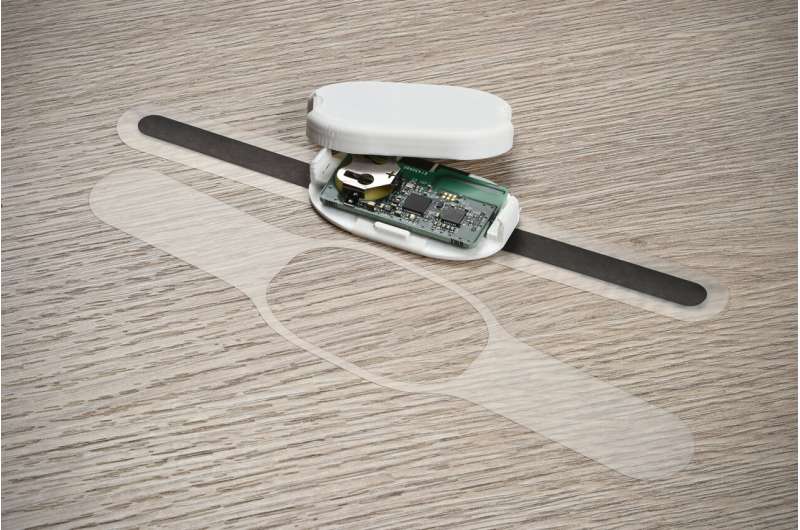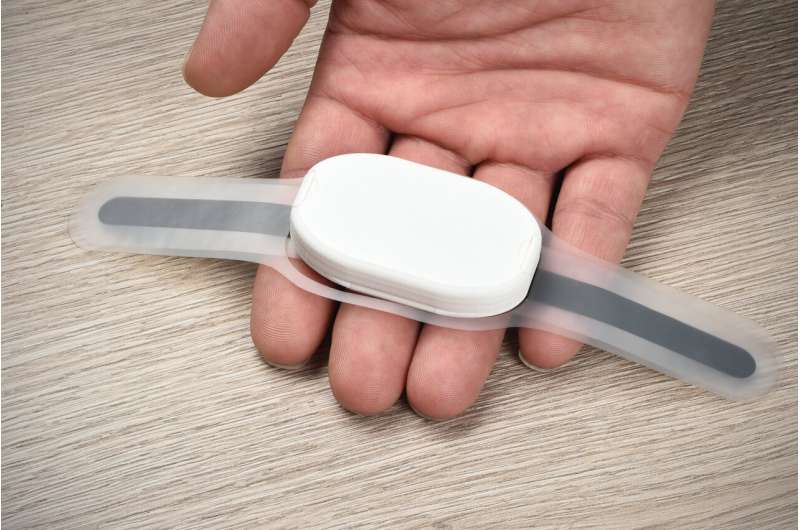This article has been reviewed according to Science X's editorial process and policies. Editors have highlighted the following attributes while ensuring the content's credibility:
fact-checked
trusted source
proofread
Researchers develop recyclable, fully biodegradable ECG patch

VTT Technical Research Centre of Finland has developed a new sustainable electrocardiogram (ECG, also known as EKG) patch that is fully recyclable and made of biomaterials. The device is modular, so electronic components can be easily removed from the disposable patch and used again. The patch itself is made of nanocellulose and printed with carbon conductors and sensing electrodes. The biodegradable patch is made of VTT's new material cellulose e-skin, which replaces traditional plastic in wearable skin applications.
An ECG is one of the most established and popular ways to monitor heart conditions. It is used to record the heart's electrical signal to monitor heart health and assess for heart conditions. Currently, ECG patches are composed of electrical components on a substrate made from fossil-based sources.
The global need for sustainable ECG patches is projected to grow rapidly in the next few years. The global ECG patch and Holter monitor market was valued at USD 1.2 billion in 2022 and is expected to expand at a compound annual growth rate of 20% from 2023 to 2030. The growing prevalence of atrial fibrillation, aging, and rising incidence of cardiovascular disorders increasingly drive the market's demand.
"The health care industry has one of the heaviest environmental footprints, and manufacturers are increasingly faced with regulations to make more sustainable products. Bio-based substrates like cellulose e-skin are promising alternatives to fossil-based ones. The tricky part is the fact that they need to possess certain properties like stretchability, tear-resistance, and moisture sensitivity. We're proud to say that with cellulose e-skin, we've created a new film with huge potential for use in the medical industry," says Mohammad H. Behfar, senior scientist at VTT.
Health care accounts for 8% of total U.S. emissions and remains one of the largest waste-producing sectors in the world. Plastic is used in medical supplies because it is very inexpensive to source and easy to sterilize. As a result, plastics account for 25% of the waste generated by hospitals, and 91% of plastics are not recycled and end up in landfills or nature.
Meanwhile, in 2019, people discarded 53 million tons of electronic waste, and the number will increase by 38% by 2030. The rising demand for small and wearable electronics is largely responsible for the issue because many small and complex parts make recycling these items increasingly difficult. Less than 20% gets recycled.
"Ours is the first nanocellulose-based ECG patch with no plastic additives. The wider implications go beyond ECG as cellulose e-skin can be used in a wide array of wearable devices in the future. The film is strong, flexible, transparent, breathable and has good printability. Potential other applications could be, for instance, in printed energy storage and harvesting devices," says Aayush Jaiswal, research scientist at VTT.

In Europe, a major incentive for creating more sustainable medical products is the European Commission's Circular Economy Action Plan. It's one of the main building blocks of the European Green Deal, which puts increasing pressure on manufacturers in all industries to create more sustainable products in the face of increased environmental taxation.
VTT is currently looking to team up with partners who are interested in industrial-scale manufacturing of sustainable wearable electronics.





















